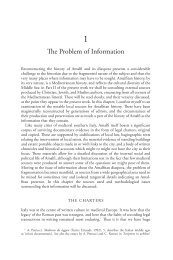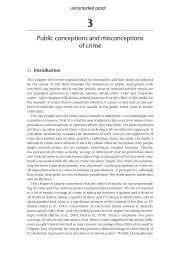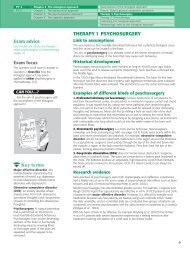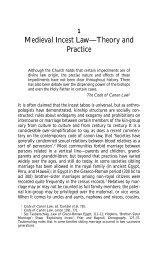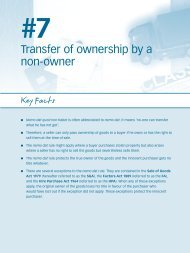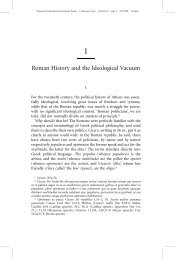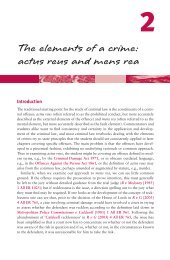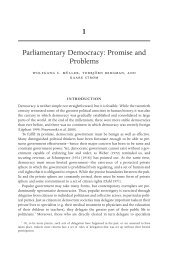Chapter 11 The Tort of Negligence - OED-update - Oxford University ...
Chapter 11 The Tort of Negligence - OED-update - Oxford University ...
Chapter 11 The Tort of Negligence - OED-update - Oxford University ...
Create successful ePaper yourself
Turn your PDF publications into a flip-book with our unique Google optimized e-Paper software.
<strong>Chapter</strong> <strong>11</strong> <strong>The</strong> <strong>Tort</strong> <strong>of</strong> <strong>Negligence</strong> 343<br />
was the manufacturer <strong>of</strong> the beer. <strong>The</strong> claimant could not sue the defendant in the law <strong>of</strong><br />
contract as there was no contract between them.<br />
Decision: Every person owed a duty <strong>of</strong> care to his neighbour, who was somebody that a<br />
person could reasonably foresee would be injured by his acts or omissions. <strong>The</strong> defendant<br />
could reasonably foresee that someone, other than the purchaser, would drink the ginger beer<br />
and, therefore, owed a duty <strong>of</strong> care to the ultimate consumer. <strong>The</strong> neighbour principle was laid<br />
down by Lord Atkin who said:<br />
You must take reasonable care to avoid acts or omissions which you can reasonably foresee<br />
would be likely to injure your neighbour. Who then is my neighbour? <strong>The</strong> answer seems to<br />
be persons who are so closely and directly affected by my act that I ought reasonably to<br />
have them in contemplation as being so affected when I am directing my mind to the acts<br />
or omissions which are called in question.<br />
Although the neighbour principle had the potential <strong>of</strong> being applied in numerous circumstances,<br />
the development <strong>of</strong> the new tort <strong>of</strong> negligence was very cautious to begin<br />
with. However, in the 1970s and early 1980s the scope <strong>of</strong> the duty <strong>of</strong> care was expanded<br />
by the courts, and it appeared that a duty <strong>of</strong> care could be owed for any reasonably<br />
foreseeable negligently-inflicted loss, unless there were policy reasons against imposing<br />
a duty.<br />
Policy reasons means that, when making a decision, a court should take into account<br />
the implications the decision will have for law in society. Factors that influence judges<br />
include:<br />
• Which party is best able to afford the loss? Is one <strong>of</strong> the parties insured?<br />
• Will there be flood <strong>of</strong> claims? If a duty is imposed will the number <strong>of</strong> potential claimants<br />
be huge?<br />
• Will imposing a duty encourage people to take more care in certain circumstances?<br />
• Are there moral reasons for imposing a duty?<br />
<strong>The</strong> Three-Stage Test<br />
<strong>The</strong> rapid expansion <strong>of</strong> persons owing a duty <strong>of</strong> care to others came to an end in the late<br />
1980s. Senior judges clearly became worried that the tort <strong>of</strong> negligence could get out <strong>of</strong><br />
control and sought to check its growth. A more cautious approach to the development <strong>of</strong><br />
the duty <strong>of</strong> care was taken. Unless a duty <strong>of</strong> care had already been firmly established by<br />
previous cases, such as a duty owed by manufacturers to consumers, vehicle-drivers to<br />
passengers, or employers to their employees, then a three-stage test had to be satisfied.<br />
<strong>The</strong> three-stage test to determine whether a duty <strong>of</strong> care exists was set out by the House<br />
<strong>of</strong> Lords in Caparo v Dickman (1990).





